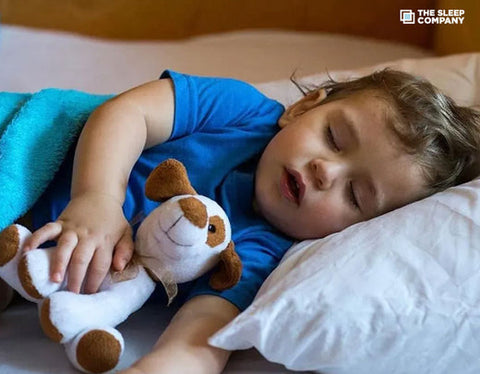My Cart

How To Make Your Toddler Sleep Alone

Being alone doesn’t mean lonely. And, the ability to enjoy solitude is something that we develop through our lives. It doesn’t happen naturally but is a skill that requires practice from a young age. This starts with putting oneself to sleep right in the initial years of life.
If we actually take a deeper look, infants and toddlers rely on adults for everything, from food to dressing them up. The only time they are alone is when you put them down for a nap or to snooze for the night.
Initially, both the parent and the child may feel overwhelmed, but sleeping alone can be beneficial for your child. Let’s unpack everything you must know ahead.
Why Your Toddler Should Sleep Alone?
First, let’s understand all the reasons why it is beneficial for your toddler to sleep alone.

Develops A Sense of Independence
As aforementioned, being independent is a skill we all develop from a young age. And, sleeping alone is the first step in this process. When toddlers sleep alone, it nurtures a sense of confidence as they learn to manage bedtime routines and sleep on their own.
Promotes Self-Soothing
Sleeping alone encourages toddlers to learn self-soothing techniques. This is an important skill that can help them manage stress and emotions as they grow older. Self-soothing is nothing but the ability to calm themselves without any help, such as sucking a thumb or cuddling a comfort object.
Helps Establish Healthy Sleep Habits
When you teach your toddler to sleep alone, it can help them develop healthy sleep habits. This includes a consistent bedtime routine and a comfortable sleep environment, which is important in the long run.
Good For The Parents
While sleeping alone benefits your little one, it can be great for you too. This gives you much-needed time to rest and recharge. Also, when your toddler spends time alone. It gives you more time for yourself and promotes a healthier family dynamic.
Better Quality Of Sleep
Both you and the little one may experience a better quality of sleep when they sleep separately. Toddlers may be less likely to be disturbed by adult movements or snoring, while parents can sleep without the disruptions that often come with co-sleeping.
Transition to Preschool or School
When your baby is able to sleep alone, it can be particularly helpful when your toddler is about to transition to preschool or kindergarten. Many educational settings require children to nap or rest independently, and having experience with solo sleep can ease this transition.
Safety Concerns
Co-sleeping can sometimes be hazardous, such as accidentally rolling onto the child. It is particularly risky for infants. And, toddlers are more active and start to move around, so again, this poses a risk.
The Right Age For Your Toddler To Sleep Alone
When it comes to your toddler sleeping alone, it is a big change for both you and the little one. Generally, experts suggest that the sooner your child learns to sleep alone, the better. And, the best age is between 1-3 years old.
5 Tips To Make Your Toddler Sleep Alone
That said, it's important to approach the transition to sleeping alone with patience and understanding. Some children may embrace the change quickly, while others may need more time to adjust. The below tips can be useful for you. Take a look!

1. Create A Cozy Space
The very first step is to convert your toddler's sleep space into a cozy environment for peaceful nights. Choose soft, inviting bedding. You can choose something that's adorned with their favorite characters.
Add a cuddly stuffed animal or two to provide comfort. Consider a gentle nightlight, something not too bright. This can banish any nighttime fears they may be holding.
The idea is to create an atmosphere that feels safe and secure yet induces a sense of calmness. Make their bed feel welcoming. When your little one feels snug and happy, it becomes easier for them to drift off into dreamland.
2. Have A Consistent Bedtime Routine
Having a consistent bedtime is not just good for adults but also for children. When we say consistent bedtime routine, it means going to bed and waking up at the same time. Doing this ensures that your baby easily adjusts to the magic of sleep.
You can also build a nighttime routine that calms them down. Doing it regularly makes it like a signal that it's now time to sleep.
Begin with soothing activities like reading a favorite story or singing a lullaby. Follow this with a warm bath to create a relaxing transition from playtime to bedtime.
Always keep the routine predictable and not too stimulating. These comforting rituals establish a sense of security too, which can make bedtime a cherished part of the day. A consistent routine not only builds healthy sleep habits but also provides your toddler with the reassurance needed for a peaceful night's rest.
3. Take Baby Steps
You don’t have to do it all at once. It’s okay to take your own time. You can help your toddler gain independence in their sleep journey by taking gradual steps. Start by sitting with them until they feel secure and fall asleep. As days pass, slowly reduce your presence and let them become accustomed to the idea of sleeping alone.
A gradual approach eases the transition and makes the process more manageable for your little one. By nurturing a sense of independence at their own pace, you let your toddler feel confident and comfortable in their ability to sleep alone. All of this creates a positive bedtime experience.
4. Learn To Deal With Crying
When your child cries during the transition to independent sleep, don't go back to the same old pattern. Try to understand the cause and act accordingly.
Check for any immediate needs like hunger or discomfort. If all is well, offer comforting words and gentle reassurance without immediately picking them up.
Gradually extend the time between comforting interactions and let them learn self-soothing skills. Have a consistent approach.
We know it's tough to hear your little one cry. But this process teaches resilience and helps them adjust to solo sleep.
Remember, it's a temporary phase, and by responding with love and offering the right guidance, you are helping them build confidence in their ability to sleep independently.
5. Communicate With Them
Effective communication is super necessary during the transition phase. Use simple words to explain the importance of sleeping alone and the positive aspects of it. Be encouraging.
Also, ask your toddler to express their feelings and listen attentively. Validate their emotions and let them know it's okay to feel uncertain.
Regularly talk about bedtime as a special, cozy time, building positive associations. Open communication builds trust and helps your toddler feel secure. It makes the process of sleeping alone a smoother experience.
Wrapping Up
When it comes to sleep, there is never a one-size-fits-all solution. Every child is different, and the decision to encourage independent sleep should be based on your child's personality, needs, and your family's values. To help you out, try the tips mentioned above.
Some families choose co-sleeping, while others find that independent sleep works best for them. If you have concerns or questions about your toddler's sleep habits, it's also best to consult your healthcare practitioner who can guide you in the right direction if you need any further information.





























































